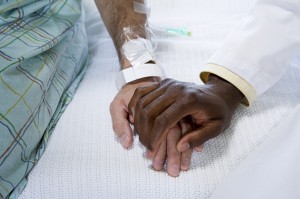During the family meeting, as the physician reviews the patient’s prognosis, one family member begins to cry. The physician explains the patient’s condition and, judging by the tone of voice, it does not sound promising. A dozen family members are present for this meeting. The physician describes the vital signs, the infection and the failing organs. The family members, through their tears, begin to describe the husband, father and friend in the hospital bed.
Intensive care unit (ICU) admissions are increasing every year. Patients and family members are often faced with difficult decisions during these admissions. “What would your loved one want?” is a question many family members are not prepared to answer. And for physicians — especially for physicians in training — these questions can be hard to ask. Families wish for a miracle to occur, but physicians often lack that magic wand.
Family meetings in the ICU can be stressful for young physicians. This may be the first time in their training that they are asked to lead meetings where dying is the most likely outcome for a patient. On top of that, ICU physicians often do not know their patients on a personal level. When caring for a critically ill patient, the majority of time is spent trying to manage necessary, lifesaving interventions, with little time to get to know the patient and their family.
At Johns Hopkins Bayview Medical Center, Aliki professors and critical care physicians are helping physicians-in-training better prepare for these ICU family meetings. Every two weeks, residents from the cardiac and medical ICUs meet to discuss any family meetings they participated in, what they thought of the meetings and what they learned. The residents also receive pocket guides to help them guide future family meetings. These lessons are supplemented with conferences called TRAIL — transitions after ICU life — which occur every few months. At TRAIL conferences, families whose loved ones spent time in the ICU are invited to discuss their experiences, especially with family meetings.
The practice of medicine has many rewards, and one of the most meaningful of which is the connection between a patient and a physician. That relationship can be as important as any prescription or intervention. However, the ICU is a place where that level of humanity can be overlooked. With all the noise, blood work and procedures, we often forget to ask who the patient is. But with the help of leadership at Johns Hopkins Bayview Medical Center, physicians in training are more likely to understand that their critically ill patient is also a husband, a father and a friend to the people sitting in the family meeting.